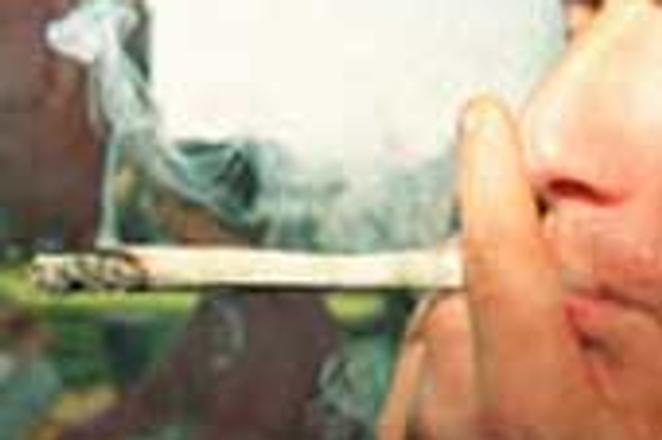Drug use is rising in Slovakia - officials say that more than 4,000 drug addicts now live in Bratislava alone, while one in four high school students have tried marijuana. Despite these alarming figures, the government has decided to cut 160 million crowns from its anti-drug programme.photo: TASR
In the months before the end of President Michal Kováč's term last year, a strange sight appeared directly across the street from the Presidential Palace in downtown Bratislava. In a clear slight to the President, the Donar ad agency mounted a giant digital countdown clock which ceremoniously ticked off the days until the end of the Kováč's term.
At the time, no one seemed to know how such a partisan slap in the face could have been erected in a city zone where all constructions require a Presidential office-issued permit.
But according to Ľubomír Okruhlica, the director of the Center for Drug Addiction Treatment and the government's main expert on drug addiction, the Donar agency probably used a permit and money it had secured to run an anti-drug campaign to erect the clock.
The message "Love life, not drugs" appeared in small letters on the bottom of the clock.
The head of the Donar agency could not be reached for comment.
Anti-drug labyrinth
According to Vojtech Puha, director of the Public Expenditures Section at the Finance Minister, the Donar clock was a typical example of how anti-drug funds were misspent under the previous government.
Lack of oversight was not the only problem affecting drug programme spending. Anti-drug money was also distributed too late to be fully used, officials said. Other funds came with certain strings attached which seemed illogical to those involved in dealing with Slovakia's growing drug problem; the high costs of drug treatment, for example, could not come out of the special government fund earmarked for fighting drugs.
The anti-drug effort will have fewer\ such boondoggles this year, but not because of an increase in oversight. Instead, the government has completely eliminated the special anti-drug budget for 1999, a move which will likely lead to major cutbacks in the efforts ministries are making to fight drugs.
"This was the only possible solution," said Deputy Prime Minister Pál Csáky of the budget cuts. Csáky is also chairman of the Committee of Ministers to Fight Drug Abuse and Control Drugs
Last year, Csáky said, the government granted 210 million Sk ($5.25 million) to a special fund for anti-drug efforts. Of that, 50 million Sk ($1.25 million) went to the Interior Ministry for a special anti-drug police task force.
The rest went largely to the Health Ministry for drug-abuse related costs, to the Culture Ministry for drug awareness campaigns, to the Education Ministry for drug-prevention programmes at schools, and to a special Anti-Drug Fund available to non-profit organizations.
But there were major problems with the distribution of the money. For example, the Centre for Treatment of Drug Addicts in Bratislava got its 8 million Sk months late, meaning that it ultimately had to return to the government 4 million Sk of the money that had been granted.
"Because it came in August, it couldn't be fully used," said the Centre's Okruhlica.
In addition, none of the money was allowed to be used to actually treat the addicts. Those costs were supposed to be covered by health insurance companies, but because of the financial problems experienced by these firms, most of the money came late. That made treatment difficult, as it can cost 30,000 Sk for two weeks in a detoxification program, Okruhlica said.
"Realising that treatment of drug addicts is one of the most expensive costs, the government should reconsider the way this money is being used," he said.
Instead, the Center ended up using some of the money to put new windows and air-conditioning in its building, a move which drew fire from the Finance Ministry. "That, to me, does not constitute anti-drug activities," Puha said.
Okruhlica defended the use of the money spent on repairs, but he did agree that a clear conception of what the money should be used for was missing. "There must be some straight rules," he said.
Many activities funded by the anti-drug money actually had nothing to do with drugs whatsover, but with the usual operations of various ministries, Puha added. The Finance Ministry, for example, used the money to pay for more "anti-drug" customs officers, who in reality were given general assignments, Puha said.
Of the total funding last year, 50 million Sk was allocated to the Anti-Drug fund for non-governmental organizations. But Okruhlica said that money was only available to help start projects, not to keep them funded year after year. As a result, he said, Slovakia has dozens of small programmes struggling to survive rather than a few healthy organisations concentrating their efforts on fighting drugs.
In 1999, the government will put another 40 million Sk into the Anti-Drug Fund. But if the ministries wish to continue other drug efforts, they will have to find the money in their own general budgets, which, with the exception of the Health Ministry, have all suffered deep cuts. The final version of the budget is due to be approved by parliament in late March.
Puha said that the anti-drug money had been cut in line with general restrictions affecting the entire state budget, but conceded that the way in which the money was misused in the past had not disposed the cabinet to be generous in 1999.
Meanwhile, the number of people who are addicted to drugs in Slovakia is growing.
In 1998, Slovakia registered 2,199 people in drug treatment programmes. Out of that figure, 1,660 patients were hooked on hard drugs, of whom 1,100 came from Bratislava. The number of drug addicts now estimated to live in Bratislava alone is over 4,000, Okruhlica said.


